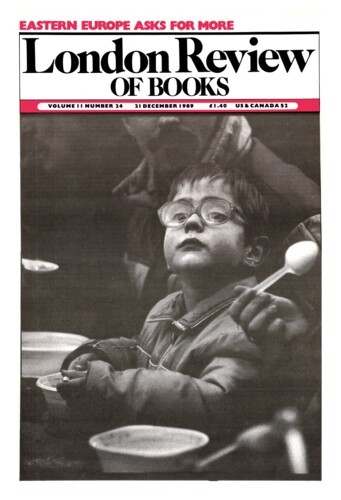Tit for Tat
Margaret Anne Doody, 21 December 1989
The publication of this anthology is an important event – as significant as the appearance of Roger Lonsdale’s earlier Oxford Book of 18th-Century Verse, that unmarmoreal volume. As our battle of the books is waged, and canons to the left and right volley and thunder, this dignified Fellow of Balliol has done more to change our view of the 18th century than many avowed canon-chargers with more ostensibly up-to-date artillery. In the production of these two anthologies Lonsdale changes, not just a book list, but our view of the nature of poetry-writing and reading in ‘the Augustan Age’. Earlier in this century it was customary to praise the 18th century as the last bastion of the old order which referred itself to a Divine system of things. To emphasise the Providential and hierarchical aspects of the period is to overlook the important fact that men and women of the late 17th and 18th centuries were the first who knew themselves to be of ‘a period’, belonging to ‘an Age’. To regard oneself as inhabiting a local, human-made and changeable realm may in some respects be disconcerting: it can also be exhilarating. The very instability presented in acknowledging that one lives at a particular period offers hope for future change, and encourages changes of focus in the present. The mobilities and uncertainties of the 18th century were co-opted by emergent capitalist theory and practice, and by the powerful intellectual movements we collectively term ‘the Enlightenment’. Philosophers and gentlemen sought to identify universal ‘human nature’, and to identify the modes of social operation that would best enable the fulfilment of the aspirations of both groups and individuals – best bring ‘happiness.’’

